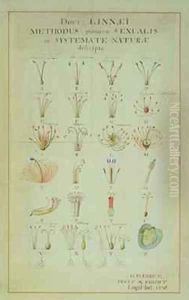Carl Linnaeus Paintings
Carl Linnaeus, born on May 23, 1707, in Råshult, Sweden, was not primarily an artist in the traditional sense but a renowned botanist, physician, and zoologist, who laid the foundations for the modern scheme of nomenclature and is known as the father of modern taxonomy. He is also considered one of the pioneers of ecological thinking.
Linnaeus was born to Nils Ingemarsson Linnaeus and Christina Brodersonia. His father, a keen gardener, introduced him to the wonders of plants and nature early on. Linnaeus began his higher education at Lund University in 1727 but transferred to Uppsala University in 1728, where he became deeply involved in the study of botany.
After completing his studies, Linnaeus conducted several expeditions to explore the flora of Sweden. His work culminated in the publication of 'Systema Naturae' in 1735, which outlined his new system for classifying plants and animals. This work established the binomial system of nomenclature, in which each species is given a two-part Latin name.
Linnaeus's influence in the fields of taxonomy and natural history was profound. He described and named many species, bringing order to the chaotic and disparate nomenclatural practices of his time. His other significant works include 'Species Plantarum' and 'Genera Plantarum', which further developed his classification system.
Despite his focus on science, Linnaeus's work had an artistic element to it as well. He worked closely with botanical illustrators to visually represent the species he was documenting. These illustrations were vital for the dissemination of his classification system and are valued not only for their scientific importance but also for their aesthetic qualities.
Linnaeus was ennobled in 1761, adopting the name Carl von Linné (Latinized to Carolus Linnaeus), and he continued to teach and write until his death on January 10, 1778, in Uppsala, Sweden. His legacy lives on in the countless plant and animal species names that remain in use today, as well as in the Linnaean Society, which was founded in his honor and continues to promote the study of natural history.
